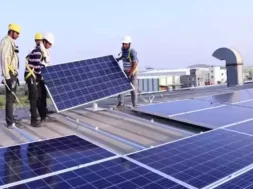
Electric vehicles are gaining popularity, prompting Farmington to consider charging stations
Horace Nissan’s owner talks about challenges selling electric vehicles
- Existing Tesla stations in Farmington receive steady traffic.
- The City of Aztec already offers an electric vehicle charging station.
- While local car dealers struggle to sell electric vehicles, Durango residents are more likely to buy them.
FARMINGTON: The City of Farmington may install four electric vehicle charging stations for the public to use and an additional one at the Municipal Operations Center to charge an electric vehicle Farmington Electric Utility System plans to purchase.
The Farmington Public Utility Commission — a city advisory board — recommended the City Council approve purchasing and installing the charging stations. Each station costs about $15,000. These chargers will be same brand as the existing charging station in the City of Aztec.
The commission, as well as Farmington Electric Utility System Director Hank Adair, described the electric vehicle charging stations as an economic development tool.
The utility commission voted five to three in favor of the charging stations during a special meeting on June 20.
Horace Nissan and Hyundai owner speaks to commission
Clifton Horace, who owns Horace Nissan and Hyundai, attended the commission meeting to give input about electric vehicles.
He said electric vehicles were slow to become popular due to price and range anxiety, however car companies are trying to increase the market for the vehicles.
“There is a tsunami of electric vehicles coming,” Horace said. “You currently have a choice of seven — three of those are Teslas — that you could buy that are full-on electric. We’re going to have 70 in two years. Worldwide we will have 200. Whether we can sell them, I don’t know.”
While Durango, Colorado, dealerships have had success selling the electric vehicles, Horace Nissan and Hyundai has not managed to sell them.
Horace said he bought three Nissan Leafs to sell, but no one bought them. Nevertheless, Horace commended the city for talking about charging stations. He said the price will have to decrease and the range will have to improve before he anticipates being able to sell electric vehicles at his dealerships.
“A hybrid is a much more logical vehicle for us in the Four Corners,” Horace said. “It just makes so much more sense. It’s kind of crazy to have a vehicle that couldn’t get to Albuquerque. You buy a Leaf, you couldn’t get there. You’d have to stop and sleep in Cuba.”
However, Horace does anticipate the demand for electric vehicles will increase as manufacturers promote them. He said they are fun to drive and require less maintenance.
Existing Tesla charging stations receive steady traffic
There are currently two existing charging stations in Farmington. Both charging stations are located at hotels and can only charge Teslas.
One of those charging stations averages 5,000 kilowatts of usage each month, Adair said.
That is about two to three vehicles a day charging for six to eight hours, according to Commissioner Marty Johnson, who does maintenance for the hotel.
Utility director proposes seven possible locations

These parking spots off of North Allen Avenue in downtown Farmington are one possible location for an electric vehicle charging station. (Photo: Hannah Grover/The Daily Times)
These stations will each have the ability to charge two vehicles at a time and will be located in different parts of the electric utility’s service area.
Adair proposed seven locations including downtown Farmington, San Juan Regional Medical Center, Berg Park, the municipal operations center off of Browning Parkway, Farmington Museum at Gateway Park, the East Main Street shopping corridor and Navajo Lake State Park. He said the city will need agreements if it chooses to locate charging stations off of city property.
Adair chose these locations due to their proximity to amenities like shopping, recreation and entertainment.
Commissioner Jeff Parkes recommended having a charging station located at the Farmington Public Library while Commissioner Joanne Duckwitz suggested areas like the aquatic center, golf course or baseball fields.
If the City Council approves electric vehicle charging stations, the city will select four locations. The City Council would also be tasked with setting rates for the charging stations. Adair said the charging stations in the region range from free to $1.50 per hour. An hour of charging would allow most electric vehicles to drive for about 25 miles, he said.
Adair estimates it would require four vehicles to use each station each day at a rate of $1.25 per hour for the city to break even on its investment.
Hunter hesitant about city-owned electric vehicle charging stations

An electric vehicle charging station is pictured, Friday, June 21, 2019, in Aztec. (Photo: Hannah Grover/The Daily Times)
Commissioner Chris Hunter was one of the three commissioners who voted against the measure. Hunter said he would have supported a smaller number of charging stations and he is in favor of having a charging station for city use.
“The need for the city to learn about the technology and how it works in a risk-controlled environment at (the municipal operations center) makes perfect sense to me and electric utilities have been doing that for a long time,” he said.
Hunter said he does not support subsidizing electric car ownership and there were too many unknown variables for him to support the four public charging stations.
Hunter said the city should reach out to private businesses like Sam’s Club and Target to see if they would pay for a charging station to be located in their parking lots. This would allow the customers to charge their vehicles while shopping.















